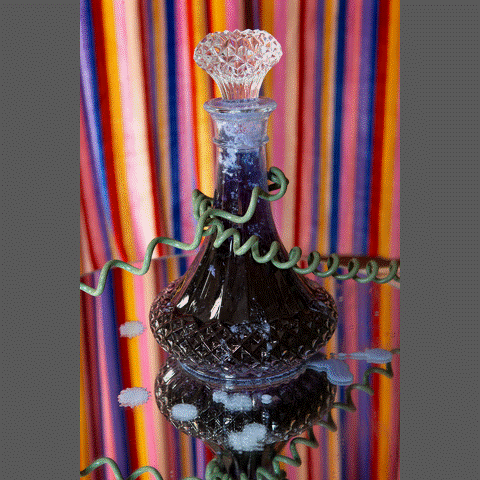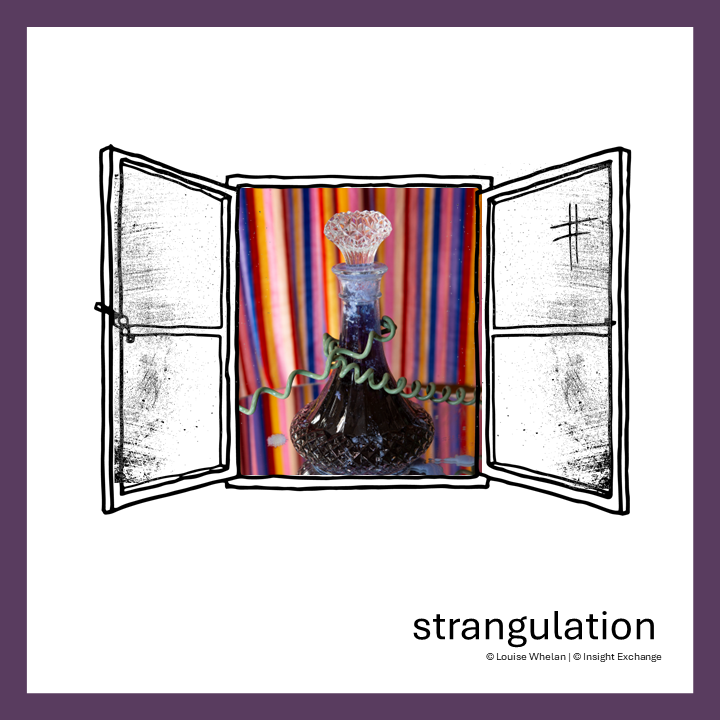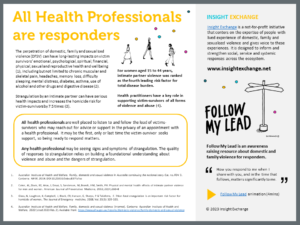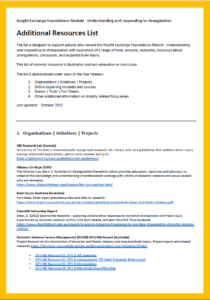In focus - strangulation
The perpetration of strangulation is a serious problem globally. So, how can we improve our understanding of and responses to strangulation?
We invite you to build on your understanding and responses through these free (donated) resources (animation, module, artworks) below.
Animation: View/share/embed the short animation (5mins) about the dangers of strangulation.
"Seeing the animation gave me the knowledge and confidence to ask the questions about strangulation." [VANS Social Worker]
This animation contains descriptions of and resistance and responses to violence and abuse. The end of animation refers to two reflection resources: My Safety Kit and My Dignity
Module: Building understanding of and responses to strangulation (includes Auslan sign-language)
References: Open the list of references used in the module.
Responses/Feedback: Share with us your de-identified response/feedback to the module.

The Arts Lab collection of five original artworks by collaborating artist Louise Whelan feature in the Foundations Module - Understanding and responding to strangulation.
The anonymous voice of a persons lived experience of strangulation is presented in text across the collection.
Click on the button below to open the collection in a lightbox.
Arts Lab Strangulation Collection | Artworks © Louise Whelan. These artworks were developed with Insight Exchange and each image is protected by copyright. To use images permission must be sought from Insight Exchange – Apply here.
Book a free team session (virtual)
Explore more about the structure of the session and how to book here:
Strangulation: To support team responses, the foundational module (Strangulation) is being shared in a 90min virtual session. Teams can make use of this opportunity and these resources to talk together about building on social, service and system responses to strangulation.

Team virtual session structure: 90 mins
- 60mins view the digital module
- 30mins Q&A with Insight Exchange Associate Danielle Allen.

Danielle was awarded a Winston Churchill Fellowship to explore collaborative responses to victims of interpersonal violence who have experienced non-fatal strangulation and traumatic brain injury in the USA and Canada. Read the report here Churchill Fellowship project and report.
Summary of bookings and responses
Read the running record of team bookings into the virtual sessions. Examples of feedback:
- “This was excellent. I learnt a lot of useful knowledge about how to respond and better understand this issue. I was thinking about the workshop for days and thinking of ways I could help share my learnings.”
- "The presentation is very informative, and I greatly appreciate the use of victim survivors' voices and experiences."
- "I thought it was fabulous, very easy to understand and to stay focused. I loved that it covered the Foundations as well."
- "Fantastic presentation- brilliant at locating responsibility, acknowledging resistance of victim survivors and using appropriate language."
- "A confronting but equally informative session. It gives more understanding about language used in relation to strangulation."
Summaries (Nov 2022 - June 2023)
Booking summaries
- Read Booking Summary (Australia)
- Read Booking Summary (New Zealand)
- Read Booking Summary (Canada)
Reflections and insights from participants who viewed the module
Read participants key insights and reflections about what they will start, keep and stop doing in response to the module, and who they wish had access to the resources.
- Read 'My Key Insight'
- Read 'Start Keep Stop' summary
- Read 'I wish' summary
Archive: Read the interim summary report (Oct 2022 - March 2023)
Additional Resource List
The additional resources list is designed to support people who viewed the Insight Exchange Foundations Module - Understanding and responding to strangulation with awareness of a range of tools, projects, networks, resources about strangulation, concussion, and acquired brain injury.
This list of external resources is illustrative and not exhaustive or conclusive.
The list is alphabetised under each of the four headers:
- Organisations | Initiatives | Projects
- Online eLearning modules and courses
- Guides | Tools | Fact Sheets
- Other additional information or directly related focus areas
All Health Professionals are responders
The perpetration of domestic, family and sexualised violence (DFSV) can have long-lasting impacts on victim survivors’ emotional, psychological, spiritual, financial, physical, sexual and reproductive health and wellbeing (1), including but not limited to chronic muscular and skeletal pain, headaches, memory loss, difficulty sleeping, mental distress, diabetes, asthma, use of alcohol and other drugs and digestive disease (2). Strangulation by an intimate partner can have serious health impacts and increases the homicide risk for victim-survivors by 7.5 times (3).
For women aged 15 to 44 years, intimate partner violence was ranked as the fourth leading risk factor for total disease burden. Health practitioners have a key role in supporting victim-survivors of all forms of violence and abuse (4).
All health professionals are well placed to listen to and follow the lead of victims-survivors who may reach out for advice or support in the privacy of an appointment with a health professional. It may be the first, only or last time the victim-survivor seeks support, so being ready to respond matters.
Any health professional may be seeing signs and symptoms of strangulation. The quality of responses to strangulation relies on building a foundational understanding about violence and abuse and the dangers of strangulation.
Explore supporting resources for Health Professionals
The resources are designed to build on your understanding and responses to domestic, family and sexualised violence including a focus on strangulation. The resources are not advisory, exclusive or exhaustive.

Explore: All Health Professionals are responders
Open the link to specific health responders:
- Optometrists are responders
- Radiologists are responders
- Dentists are responders
- Physiotherapists are responders
- Speech Pathologists are responders
- General Practitioners are responders
- Occupational Therapists are responders
- Pathologists are responders
- Dieticians are responders
- AOD Services are responders
- Women's Health Services are responders
Pornography - Strangulation
It’s Time We talked (Australia) It’s time we talked is a violence prevention initiative that supports young people, parents, schools, government and the community sector to understand and address the influence of pornography. https://itstimewetalked.com/
Our Watch (Australia) Our Watch is a national leader in the primary prevention of violence against women and their children in Australia. It strives to embed gender equality and prevent violence where Australians live, learn, work and socialise. https://media-cdn.ourwatch.org.au/wp-content/uploads/sites/2/2020/11/20022415/Pornography-young-people-preventing-violence.pdf
The Light Project (NZ) Accessible information and resources for young people navigating sexually explicit online content including strangulation. In The Know | Got questions about porn, nudes or online sexual stuff? https://www.intheknow.co.nz/


